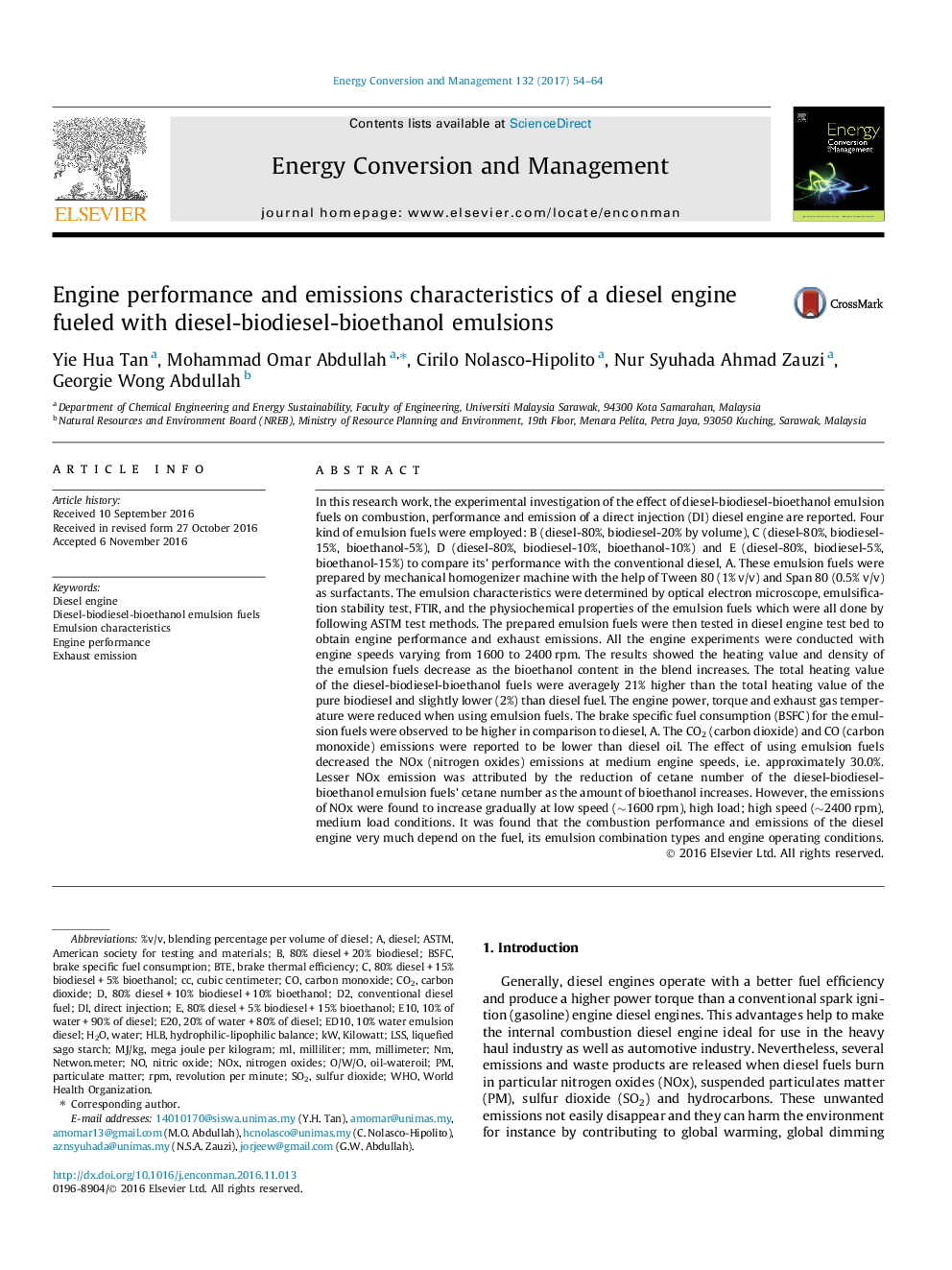| کد مقاله | کد نشریه | سال انتشار | مقاله انگلیسی | نسخه تمام متن |
|---|---|---|---|---|
| 5013097 | 1462830 | 2017 | 11 صفحه PDF | دانلود رایگان |
عنوان انگلیسی مقاله ISI
Engine performance and emissions characteristics of a diesel engine fueled with diesel-biodiesel-bioethanol emulsions
ترجمه فارسی عنوان
ویژگی های موتور و ویژگی های انتشار یک موتور دیزل با سوخت های دیزلی-بیودیزل-بیواتانول امولسیون
دانلود مقاله + سفارش ترجمه
دانلود مقاله ISI انگلیسی
رایگان برای ایرانیان
کلمات کلیدی
cubic centimeterO/W/OE20ED10LSSE10Emulsion characteristicsBSFCHLBRPMASTMH2O - H2ONOx - NOXWater - آبexhaust emission - انتشار اگزوزrevolution per minute - انقلاب در هر دقیقهNitrogen oxides - اکسید نیتروژنbrake specific fuel consumption - ترمز مصرف سوخت خاصdirect injection - تزریق مستقیمhydrophilic-lipophilic balance - تعادل هیدروفیل-لیپوفیلیAmerican society for testing and materials - جامعه آمریکایی برای آزمایش و موادSO2 - دی اکسید گوگردSulfur dioxide - دی اکسید گوگردDiesel - دیزلCarbon dioxide - دیاکسید کربنparticulate matter - ذرات معلقBrake thermal efficiency - راندمان حرارتی ترمزWorld Health Organization - سازمان بهداشت جهانیEngine performance - عملکرد موتورcarbon monoxide - منوکسیدکربنDiesel engine - موتور دیزلmilliliter - میلی لیترMillimeter - میلیمترNitric oxide - نیتریک اکسیدBTE - وسایل کمکCO2 - کربن دیاکسیدWHO - کهkilowatt - کیلووات
موضوعات مرتبط
مهندسی و علوم پایه
مهندسی انرژی
انرژی (عمومی)
چکیده انگلیسی
In this research work, the experimental investigation of the effect of diesel-biodiesel-bioethanol emulsion fuels on combustion, performance and emission of a direct injection (DI) diesel engine are reported. Four kind of emulsion fuels were employed: B (diesel-80%, biodiesel-20% by volume), C (diesel-80%, biodiesel-15%, bioethanol-5%), D (diesel-80%, biodiesel-10%, bioethanol-10%) and E (diesel-80%, biodiesel-5%, bioethanol-15%) to compare its' performance with the conventional diesel, A. These emulsion fuels were prepared by mechanical homogenizer machine with the help of Tween 80 (1% v/v) and Span 80 (0.5% v/v) as surfactants. The emulsion characteristics were determined by optical electron microscope, emulsification stability test, FTIR, and the physiochemical properties of the emulsion fuels which were all done by following ASTM test methods. The prepared emulsion fuels were then tested in diesel engine test bed to obtain engine performance and exhaust emissions. All the engine experiments were conducted with engine speeds varying from 1600 to 2400Â rpm. The results showed the heating value and density of the emulsion fuels decrease as the bioethanol content in the blend increases. The total heating value of the diesel-biodiesel-bioethanol fuels were averagely 21% higher than the total heating value of the pure biodiesel and slightly lower (2%) than diesel fuel. The engine power, torque and exhaust gas temperature were reduced when using emulsion fuels. The brake specific fuel consumption (BSFC) for the emulsion fuels were observed to be higher in comparison to diesel, A. The CO2 (carbon dioxide) and CO (carbon monoxide) emissions were reported to be lower than diesel oil. The effect of using emulsion fuels decreased the NOx (nitrogen oxides) emissions at medium engine speeds, i.e. approximately 30.0%. Lesser NOx emission was attributed by the reduction of cetane number of the diesel-biodiesel-bioethanol emulsion fuels' cetane number as the amount of bioethanol increases. However, the emissions of NOx were found to increase gradually at low speed (â¼1600Â rpm), high load; high speed (â¼2400Â rpm), medium load conditions. It was found that the combustion performance and emissions of the diesel engine very much depend on the fuel, its emulsion combination types and engine operating conditions.
ناشر
Database: Elsevier - ScienceDirect (ساینس دایرکت)
Journal: Energy Conversion and Management - Volume 132, 15 January 2017, Pages 54-64
Journal: Energy Conversion and Management - Volume 132, 15 January 2017, Pages 54-64
نویسندگان
Yie Hua Tan, Mohammad Omar Abdullah, Cirilo Nolasco-Hipolito, Nur Syuhada Ahmad Zauzi, Georgie Wong Abdullah,
